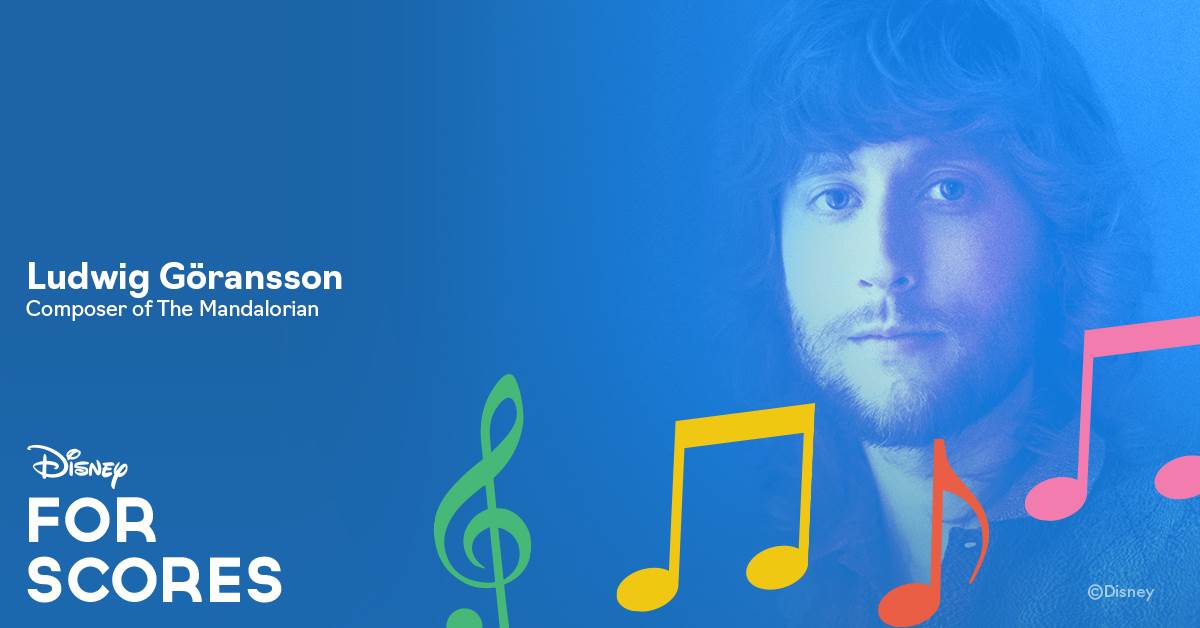The newest episode of Disney’s For Scores podcast is supersized, running at 45-minutes in length. With Ludwig Göransson as the guest, Star Wars and Marvel fans get a lot of insight into his creative process behind scoring the Disney+ series The Mandalorian and his approach to his Oscar-winning score for Black Panther. You can listen to this and all previous episodes on the podcast’s official website, but here’s a recap of some of the highlights.
Hearing “The Imperial March (Darth Vader’s Theme)” was not only Ludwig Göransson’s gateway into his Star Wars fandom, but also introduced him to the music of John Williams, who inspired his future career as a composer. It got him into classical music and the rest is history.
Prior to working on The Mandalorian, Ludwig Göransson had worked with Donald Glover as a producer on his Childish Gambino albums, who then worked with Jon Favreau on The Lion King. A combination of Jon Favreau hearing his name through Glover and Black Panther director Ryan Coogler likely led to his being asked to meet with Favreau. Not knowing what the project was ahead of time, Göransson describes the jaw-dropping feeling of walking into his office and seeing concept artwork from the top-secret show on the walls.
He got to read all eight scripts before the show started filming and began writing his themes to the script. Reconnecting with his inner child and going back to that first memory of Star Wars, Ludwig surrounded himself with musical instruments he can play, including one of the first instruments he learned in school, a recorder. He ordered a pack of different types of recorders, which included a large base recorder. He knew almost instantly after blowing his first note into it that this was the right sound for Din Djarin and he wrote the show’s main theme on it.
That simple recorder melody was built up into a more “Harmonically complex” theme that felt more like Star Wars. The recorder became the intro to what evolved into the show’s theme song. Getting behind the drums, he gave the theme a heartbeat before getting to the piano and adding the introductory two notes. The theme crescendos into a fanfare that’s an homage to John Williams’ own Star Wars theme. The chime sounds at the end were played on a 1970’s Fender Rhodes, which reminds Göransson of a celeste, which John Williams used in the original Star Wars scores.
While Ludwig Göransson wrote his music to the script first, he found that once he had the film footage to score to, he had to make it more active to underscore Din Djarin’s emotions since he conceals his face for most of the show. With the script in hand, he wrote a theme for The Child, but once he had the footage to compose to, the melody didn’t work. Jon Favreau wanted the music to emote Din Djarin’s own feelings towards Grogu, who at the time was just another bounty to him, as peculiar as the task was. After writing several other themes that didn’t work, Göransson sat down with Favreau and played chords on a guitar, which is what ended up working for the scene. That became Baby Yoda’s theme in the first season.
Going back to his origins with “The Imperial March,” writing a theme for Moff Gideon was another creative challenge because any villain theme in Star Wars will always be compared to John Williams’ legendary theme from The Empire Strikes Back. He started with more of a hip-hop snare to set his theme apart and also changed up the time signature.
Going into the second season, the musical themes were darker, but the recording process was also more complex. In the episode, Ludwig Göransson briefly talks about his score for Christopher Nolan’s Tenet, which was recorded by musicians at home. Thankfully, scoring studios reopened at the last minute for the second season. He also got to quote John Williams’ music twice. “Yoda’s Theme” is played when Din Djarin and Ahsoka Tano talk about Grogu’s past in “Chapter 13: The Jedi.” For the season finale, “Chapter 16: The Rescue,” when a legendary character shows up at the end, he folds in “The Force Theme.”
After a lengthy discussion of his work on The Mandalorian, host John Burlingame also asks Ludwig Göransson about his Oscar-winning score for Black Panther. He had already worked with Ryan Coogler on several projects, but this film required a deeper study of African music. He traveled to Senegal, a place he had studied before, to re-immerse himself with the culture and sounds. At the same time, because of Wakanda’s advanced technology, he incorporated synthesizers and modern orchestrations.
If you enjoyed this recap, be sure to listen to the full episode on your favorite podcast app.

